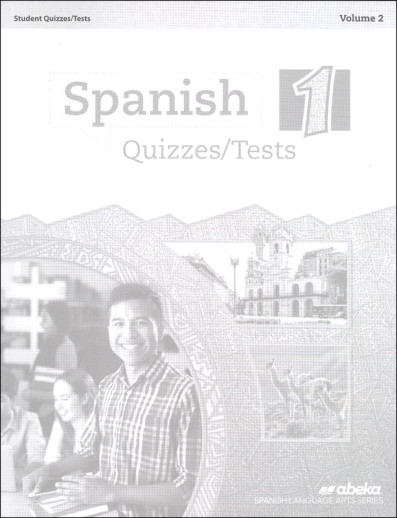We use cookies to make your experience better. To comply with the new e-Privacy directive, we need to ask for your consent to set the cookies. Learn more.
Spanish 1 Quiz and Test Book Volume 2
Each assessment included in this updated Spanish 1 Quiz and Test Book Volume 2 is designed to evaluate your students' knowledge and comprehension of the material taught in Spanish 1. With this brand-new assessment book, we've included vocab quizzes, content quizzes, tests, and exams. New questions reinforce the updated content presented in the student textbook and help track your students' progress on their path to fluency. The quizzes, tests, and grade forms for oral fluency are printed on perforated pages and give easy-to-follow directions that will save on preparation time. This book uses a variety of testing tools that allow you to properly assess student retention, critical thinking, and comprehension.
Covers quizzes, tests, and exams for the entire second semester. See Volume 1 for first semester.
Spanish teachers will enjoy the clearly defined lessons in this course. It would work well with small groups too, if you have a Spanish speaker teaching the co-op. Why is that? The new edition (2021 for year 1, 2022 for year 2) does not have pronunciation guidance in the books or on a CD. There is a pronunciation resource that is available for additional purchase from the Abeka website called Digital Teaching Slides with Teaching Aids. Without this, there is no pronunciation help. It would be challenging for a homeschool high school student to complete this course independently without some pronunciation guidance if they are new to Spanish. Also, there are daily assignments that involve students interacting with other students. Perhaps a Spanish speaking tutor would like to use this course with one or two students as well. So, now that the preliminary issues are covered, let's dig into the structure of the program.
Necessary components include the student worktext, teacher editions volumes 1 & 2, Oral Fluency Exercises student book & answer key, and the student quizzes volumes 1 & 2 with answer keys for each quiz book.
The Teacher Edition includes an overview laying out each daily 50-minute lesson very specifically: check/discuss homework (5-7min), review/quiz (8-10min), teach the lesson (10-20min), practice the new material (5-15min), give/preview homework assignment (1-2min) and there you go! Abeka definitely provides a clear path for the teacher to follow. Instructors also see reduced student pages with teaching notes in the margins. Each volume (there are 2) has 6 units and the course follows a traditional classroom school year.
The Student Worktext is consumable. Each unit begins with a Bible verse, followed by a variety of practice exercises, vocabulary lists and illustrations, spiral review sections, "survival skills" section which has situational speaking prompts, and a feature country. It is not full immersion, however, as you often see instruction in English and the rest in Spanish.
Content - Spanish 1: As far as the depth of Spanish language instruction goes, it is a pretty typical first year of high school language course. You learn present tense regular and irregular verbs, loads of vocabulary, questions, situational conversation, objects and pronouns, simple past tense, and a good amount of culture. See the table of contents for more detail.
Content - Spanish 2: The updated textbook is visually appealing. Important grammar concepts taught this year include: regular verbs present indicative, direct/indirect pronouns, present progressive, regular verbs preterite, reflexive verbs, commands, imperfect, past progressive, future, present subjunctive, passive voice, passive reflexive, relative pronouns, simple conditional, and imperfect subjunctive. ~Sara

